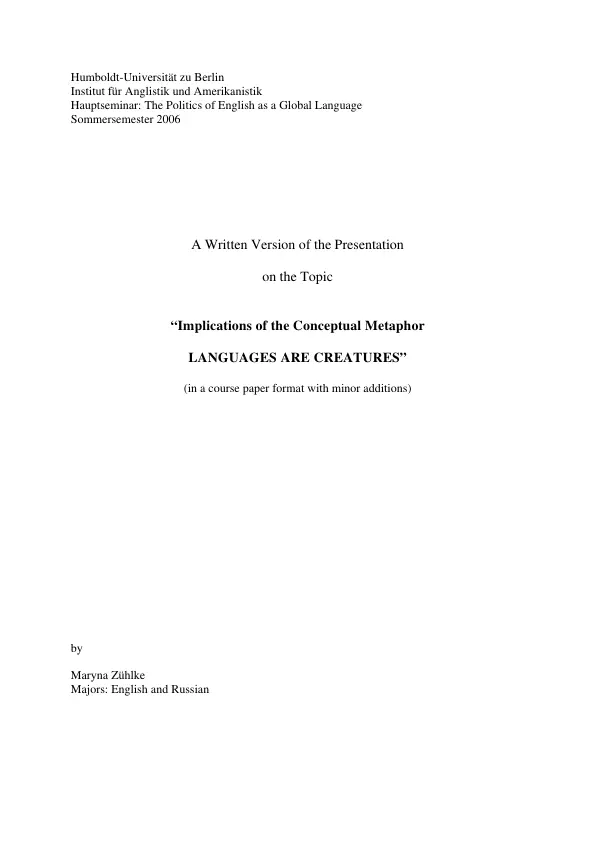Much of today’s ecolinguistic discourse is characterized by the extensive use of the conceptual metaphor LANGUAGES ARE CREATURES. The language of the Linguistic Human Rights Movement and that of such ecolinguists as MÜHLHÄUSLERand SKUTTNABB-KANGAS, to mention but a few, abound in such expressions as “language murder” or “linguistic genocide”, especially when they engage in the criticism of post-colonial English and the so-called “linguistic imperialism”.
To unravel the knot of the problems that arise from the use of the conceptual metaphor LANGUAGES ARE CREATURES, the notion of conceptual metaphor as defined by the originators of the Conceptual Metaphor Theory George LAKOFF and Mark JOHNSON is to be dwelt on first. Second, in order to better grasp the conceptual metaphor LANGUAGES ARE CREATURES in its functioning, some of the linguistic examples structured by virtue of this conceptual metaphor will be given. Finally, some of the implications of the conceptual metaphor LANGUAGES ARE CREATURES will be indicated. In short, I would like to show what the consequences of an unrestrained use of the conceptual metaphor LANGUAGES ARE CREATURES are, how they arise from the conceptual metaphor under consideration, and why these consequences are untenable from the point of view of those linguists who structure their scholarly discourse by virtue of another conceptual metaphor, namely LANGUAGE IS A TOOL. My aim is to make the reader more sensitive to the use of metaphors in general and to the use and implications of the conceptual metaphor LANGUAGES ARE CREATURES in particular.
Inhaltsverzeichnis (Table of Contents)
- INTRODUCTION
- CONCEPTUAL METAPHOR. DEFINITION.
- CONCEPTUAL METAPHOR LANGUAGES ARE CREATURES.
- IMPLICATIONS OF THE CONCEPTUAL METAPHOR LANGUAGES ARE CREATURES
- DIRECT CAUSAL LINKS
- UNTENABILITY OF DIRECT CAUSAL LINKS
- CONCLUSION
Zielsetzung und Themenschwerpunkte (Objectives and Key Themes)
This paper explores the conceptual metaphor "LANGUAGES ARE CREATURES" and its implications for understanding the politics of English as a global language. The analysis examines the metaphor's origins, its use by ecolinguists, and the potential consequences of its unrestrained application in scholarly discourse.
- Conceptual Metaphor Theory and its relevance to language studies
- The use of "LANGUAGES ARE CREATURES" in ecolinguistics and its implications for the perception of English
- The relationship between metaphorical language and real-world phenomena
- The potential for conceptual metaphors to shape our understanding of language and its role in society
- The comparison between "LANGUAGES ARE CREATURES" and the alternative metaphor "LANGUAGE IS A TOOL"
Zusammenfassung der Kapitel (Chapter Summaries)
- Introduction: This section introduces the concept of "LANGUAGES ARE CREATURES" as a central metaphor in ecolinguistic discourse, particularly within the Linguistic Human Rights Movement. The author highlights concerns regarding the potential for this metaphor to foster hostility towards English and underscores the importance of avoiding literal interpretations of metaphorical inferences.
- Conceptual Metaphor. Definition.: This chapter defines the concept of conceptual metaphor as developed by Lakoff and Johnson. It highlights the distinction between source and target domains, the role of metaphor in shaping our understanding of abstract concepts, and the power of structural metaphors to create new realities.
- Conceptual Metaphor LANGUAGES ARE CREATURES: This chapter examines the "LANGUAGES ARE CREATURES" metaphor in detail. The author outlines how this metaphor establishes similarities between language and living creatures, focusing on the concepts of agency, autonomy, and life cycles. It also emphasizes the metaphor's inherent highlighting and hiding effects, drawing attention to specific aspects of language while obscuring others.
Schlüsselwörter (Keywords)
This paper focuses on the conceptual metaphor "LANGUAGES ARE CREATURES," exploring its use in ecolinguistic discourse and its implications for the politics of English as a global language. The key themes include: conceptual metaphor theory, language and culture, linguistic imperialism, ecolinguistics, linguistic rights, and the power of language to shape perception and action.
- Citar trabajo
- Maryna Zühlke (Autor), 2006, Implications of the Conceptual Metaphor "Languages are Creatures", Múnich, GRIN Verlag, https://www.grin.com/document/154011



